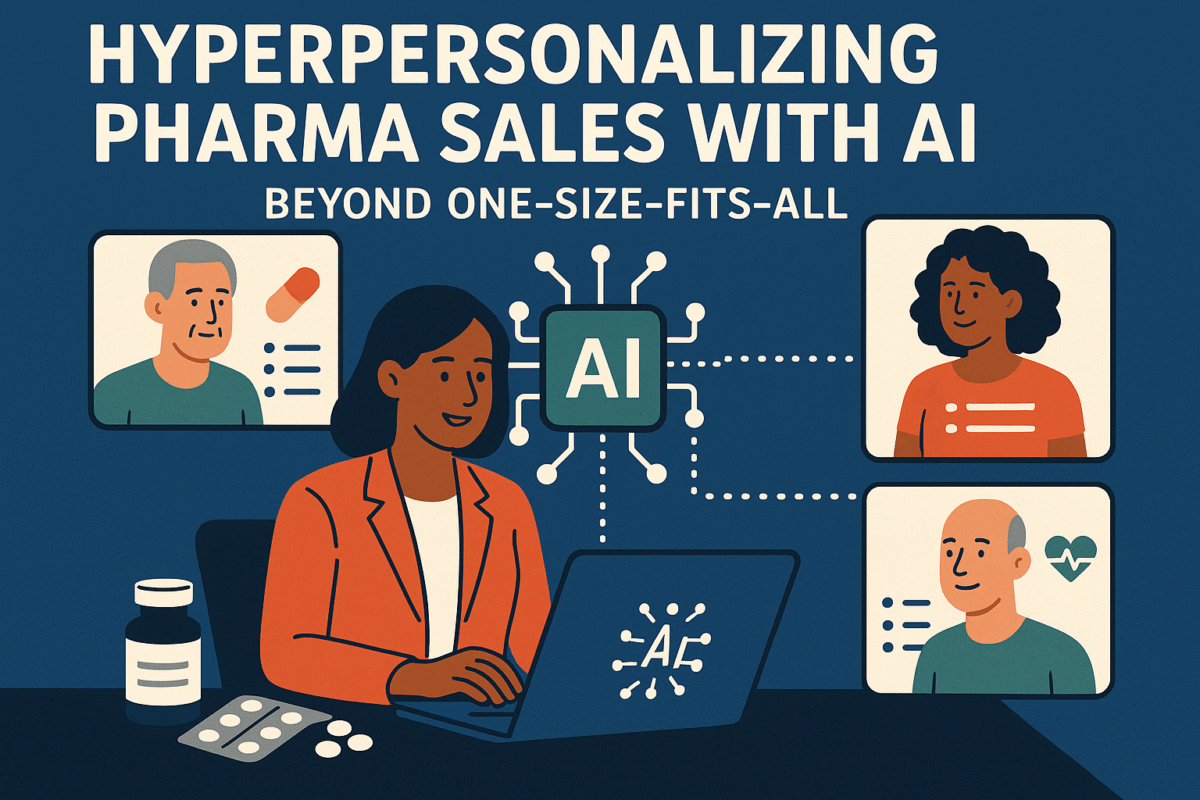In the competitive world of pharmaceuticals, one-size-fits-all sales strategies no longer meet the needs of today’s healthcare professionals (HCPs) or patients. The rise of AI for Pharma is transforming the way sales representatives engage, shifting the focus from broad, generalized approaches to deeply personalized interactions that resonate with each individual stakeholder. By leveraging advanced data analytics, machine learning models, and real-time insights, pharma companies can ensure that their sales efforts are not only more targeted but also more impactful.
The Shift from Traditional Sales to Hyperpersonalization
Pharma sales have historically relied on large-scale marketing messages, repetitive detailing, and broad product pitches. While effective in reaching many, this approach often ignored the unique needs, preferences, and challenges of individual HCPs. Doctors today are pressed for time, inundated with information, and more selective about the messages they engage with.
Hyperpersonalization moves beyond generic engagement. Instead, it integrates diverse data sources—clinical data, prescribing behavior, patient demographics, digital channel preferences, and even sentiment analysis—to create tailored strategies. This means that every interaction can feel relevant, timely, and valuable.
How AI Drives Hyperpersonalization
AI is the engine behind hyperpersonalized pharma sales strategies. With the ability to process massive volumes of structured and unstructured data, AI models can detect patterns, predict behaviors, and recommend the best next actions for sales representatives. For example:
- Predictive Analytics: AI can forecast which HCPs are most likely to prescribe a certain medication based on historical trends, enabling reps to prioritize their outreach.
- Dynamic Content Personalization: Messaging can be adjusted in real time based on an HCP’s specialty, past interactions, or patient outcomes.
- Intelligent Scheduling: AI tools help determine when and how HCPs prefer to be contacted, increasing the likelihood of a productive conversation.
- Sentiment & Feedback Analysis: By analyzing HCP responses across digital and face-to-face channels, AI can refine strategies to build stronger relationships.
Why Hyperpersonalization Matters in Pharma
Unlike many industries, pharmaceutical sales come with strict compliance requirements and complex stakeholder relationships. This makes the need for precision even more critical. Hyperpersonalization allows companies to:
- Improve engagement by speaking directly to the challenges of each HCP.
- Save time for sales reps by automating the identification of high-value leads.
- Enhance trust by delivering credible, tailored, and evidence-based information.
- Support better patient outcomes by aligning recommendations with real-world needs.
In a sector where the stakes are high, the benefits of personalization extend far beyond sales numbers—they impact the quality of healthcare delivery.
The Human + AI Partnership
While AI can provide powerful insights, the human element remains irreplaceable. Sales representatives bring empathy, emotional intelligence, and real-world experience to the table. Hyperpersonalization works best when AI augments human decision-making, equipping reps with actionable insights rather than replacing their judgment.
For instance, AI might highlight that a cardiologist has shown interest in recent clinical trial data related to heart disease. Armed with this information, the rep can craft a conversation that is relevant and timely, ultimately strengthening trust. This balance ensures that technology amplifies human connection rather than diluting it.
Challenges to Overcome
Despite the promise of hyperpersonalization, several challenges remain:
- Data Silos: Pharma organizations often struggle with fragmented data sources across marketing, sales, and clinical operations. Breaking down these silos is essential.
- Compliance Concerns: AI-driven recommendations must comply with strict industry regulations, requiring transparency and accountability in algorithm design.
- Change Management: Shifting from traditional sales models to AI-powered personalization requires cultural and operational changes. Training and trust in technology are critical.
AI for Sales: Unlocking the Next Level of Pharma Engagement
At the midpoint of this transformation, AI for sales is emerging as a game-changer. By using AI-driven CRM systems, natural language processing tools, and recommendation engines, pharma reps can go beyond transactional interactions to foster true relationships. AI empowers them to anticipate questions, address concerns proactively, and position their products in a way that feels less like selling and more like problem-solving.
This not only helps sales teams achieve their goals but also builds credibility with HCPs who value personalized, evidence-based discussions. Over time, this can lead to stronger partnerships, improved adherence to treatments, and ultimately better outcomes for patients.
The Road Ahead
The future of pharma sales lies in seamlessly integrating AI with human expertise. As AI technologies become more sophisticated, the possibilities for hyperpersonalization will only expand—whether through real-time virtual engagement, digital twins for patient modeling, or more accurate predictive tools.
Forward-thinking pharma companies that embrace hyperpersonalization today will position themselves as leaders tomorrow. They will be better equipped to meet HCPs where they are, deliver value in every interaction, and contribute to a healthcare ecosystem that prioritizes both innovation and empathy.
Conclusion
Hyperpersonalization powered by AI is reshaping the way pharmaceutical companies approach sales. By moving beyond one-size-fits-all strategies, they can deliver meaningful, timely, and personalized engagements that benefit not only their bottom line but also the broader healthcare landscape.
The integration of AI for Pharma and AI for sales isn’t just a technological upgrade—it’s a paradigm shift. Those who invest in these capabilities today are laying the foundation for a more connected, more effective, and more patient-centric future.


